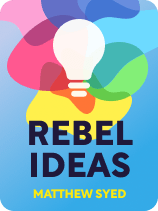

This article is an excerpt from the Shortform book guide to "Rebel Ideas" by Matthew Syed. Shortform has the world's best summaries and analyses of books you should be reading.
Like this article? Sign up for a free trial here.
What is cognitive diversity? What are its advantages? Why are cognitively diverse groups stronger?
In Rebel Ideas, author Matthew Syed explains what cognitive diversity is and why cognitively diverse groups are superior. He claims that cognitively diverse groups can harness the diverse knowledge of their members, leading to increased performance and innovative ideas.
Keep reading to learn more about what cognitive diversity is and its benefits, according to Syed.
The Advantage of Cognitive Diversity
As the founder of Matthew Syed Consulting, which helps companies reap the benefits of cognitive diversity, Matthew Syed brings years of experience cultivating diversity in the workplace into his discussion about the importance of diverse groups. In his 2019 book Rebel Ideas, he explains what cognitive diversity is and offers examples demonstrating the tangible value of cognitive diversity in group settings.
In this article, we’ll explain the meaning of cognitive diversity and the specific benefits of cognitively diverse groups, according to Syed.
Harnessing the Wisdom of Crowds
So, what is cognitive diversity? According to Syed, cognitive diversity means the range of insights, ideas, and viewpoints represented in a group, and it is the main factor that determines collective intelligence. He argues that cognitive diversity in groups provides the benefit of the wisdom of crowds: They become more collectively intelligent as their diverse perspectives create greater collective knowledge.
(Shortform note: The wisdom of crowds is often applied to stock markets in particular, as experts observe that the collective decisions of all market participants—which stocks to buy, and which to sell—create stock prices that reflect our collective knowledge. Consequently, market prices capitalize on the collective intelligence of individual investors.)
To illustrate the benefits of cognitive diversity, Syed cites Jack Soll’s study examining the accuracy of 28,000 economic forecasts. This study, Syed relates, found that top economists are about 5% more accurate than average economists.
However, the study also averaged the top six economists’ predictions, as if they were members of a single team. These results, Syed notes, were impressive: The average prediction of the top six economists was 15% more accurate than that of the top individual economist.
(Shortform note: In The Wisdom of Crowds, James Surowiecki discusses various other cases in which averaging group members’ estimates yields more accurate predictions than those of the best individuals. For example, he tells the story of Francis Galton, a British scientist who visited a fair where 800 people guessed the weight of an ox; the average prediction was 1,197 pounds, while the ox itself weighed 1,198 pounds. According to Surowiecki, this represents a broader trend: The aggregate judgment of non-experts is often more accurate than individual judgments of experts.)
Explaining these results, Syed argues that each economist’s model—like each of our perspectives—suffers from blind spots. Consequently, no individual model can capture the intricacies of the entire economy. However, when top models are combined, Syed says the result better captures these intricacies. In turn, they provide a more holistically accurate view of the economy.
Nonetheless, Syed concedes that cognitive diversity in a group doesn’t guarantee they will enjoy group wisdom—a group of cognitively diverse but incompetent individuals, for example, is unlikely to be collectively intelligent. But, when competent individuals without overlapping blind spots form a group, Syed asserts that their collective intelligence will rise above the level of any individual.
| Are Crowds Always Wiser? Although crowds are typically wiser when their members have some information about the relevant topic, the quality of the information matters too. Crowds actually become less collectively intelligent when their members are poorly informed. To show as much, consider Condorcet’s Jury Theorem, which explains how the wisdom of crowds arises in the first place. This theorem states that, if every group member has above a 50% chance of correctly answering a yes-or-no question, then the larger the group, the more likely that the majority answer is correct. Although Condorcet’s theorem originally applied to yes-or-no questions, the logic also applies to questions with multiple answers: If group members are more likely to correctly choose the right answer than any wrong answer, then as the group gets larger, the plurality’s answer is more likely to be correct. Consequently, groups with some knowledge about the question at hand become more likely to arrive at the correct answer as they add knowledgeable members. However, the converse is also true: If individual members are more likely to be wrong, then as the group grows larger, the chance that the plurality’s response is correct gets increasingly lower. For instance, because U.S. citizens had little information about President George W. Bush’s preferred nominee to the Supreme Court, they failed to correctly predict John Roberts’ nomination. |

———End of Preview———
Like what you just read? Read the rest of the world's best book summary and analysis of Matthew Syed's "Rebel Ideas" at Shortform.
Here's what you'll find in our full Rebel Ideas summary:
- Why diverse groups are more collectively intelligent than homogeneous ones
- Actionable advice for creating cognitively diverse groups
- Why systems shouldn't be designed to fit the "average" person






